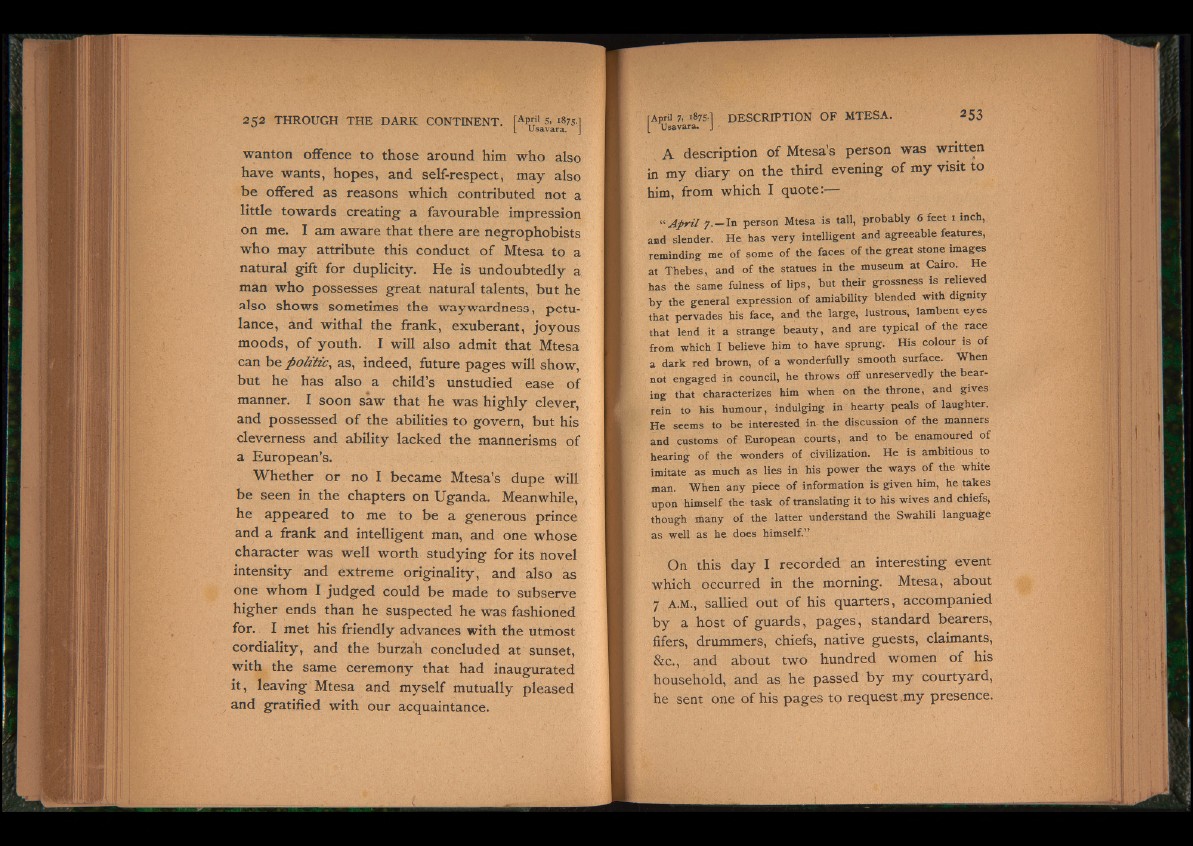
wanton offence to those around him who also
have wants, hopes, and self-respect, may also
be offered as reasons which contributed not a
little towards creating a favourable impression
on me. I am aware that there are negrophobists
who may attribute this conduct o f Mtesa to a
natural gift for duplicity. He is undoubtedly a
man who possesses great natural talents, but he
also shows sometimes the waywardness, petulance,
and withal the frank, exuberant, jo yous
moods, o f youth. I will also admit that Mtesa
can be p o litic , as, indeed, future pages will show,
but he has also a child’s unstudied ease o f
manner. I soon saw that he was highly clever,
and possessed o f the abilities to govern, but his
cleverness and ability lacked the mannerisms o f
a European’s.
Whether or no I became Mtesa’s dupe will
be seen in the chapters on Uganda. Meanwhile,
he appeared to me to be a generous prince
and a frank and intelligent man, and one whose
character was well worth studying for its novel
intensity and extreme originality, and also as
one whom I judged could be made to subserve
higher ends than he suspected he was fashioned
for. I met his friendly advances with the utmost
cordiality, and the burzah concluded at sunset,
with the same ceremony that had inaugurated
it, leaving Mtesa and myself mutually pleased
and gratified with our acquaintance.
A description o f Mtesa’s person was written
in my diary on the third evening o f my visit to
him, from which I quote:—
“ April 7.—In person Mtesa is tall, probably 6 feet 1 inch,
and slender. He has very intelligent and agreeable features,
reminding me of some of the faces of the great stone images
at Thebes, and of the statues in the museum at Cairo. He
has the same fulness of lips, but their grossness is relieved
by the general expression of amiability blended with dignity
that pervades his face, and the large, lustrous, lambent eyes
that lend it a strange beauty, and are typical of the race
from which I believe him to have sprung. His colour is of
a dark red brown, of a wonderfully smooth surface. When
not engaged in council, he throws off unreservedly the bearing
that characterizes him when on the throne, and gives
rein to his humour, indulging in hearty peals of laughter.
He seems to be interested in the discussion of the manners
and customs of European courts, and to be enamoured of
hearing of the wonders of civilization. He is ambitious to
imitate as much as lies in his power the ways of the white
man. When any piece of information is given him, he takes
upon himself the task of translating it to his wives and chiefs,
though many of the latter understand the Swahili language
as well as he does himself.”
On this day I recorded an interesting event
which occurred in the morning. Mtesa, about
7 A.M., sallied out o f his quarters, accompanied
b y a host o f guards, p a g e s , standard bearers,
fifers, drummers, chiefs, native guests, claimants,
&c., and about two hundred women o f his
household, and as he passed b y my courtyard,
he sent one o f his pages to request .my presence.